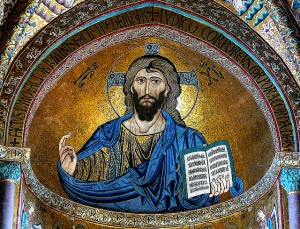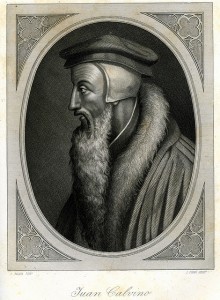


I find Christian faith coherent, intellectually rigorous, and deeply soul-satisfying.
Why?
Probably because I have been fed a hearty diet of Reformed Theology.
- I did my doctoral dissertation on John Calvin, the Reformed theologian who shaped the tradition more than any other.
- For a good long while I’ve regularly taught the theological summaries that make up the Presbyterian theological standards, the Book of Confessions, to church members and seminarians.
- I’ve written a small book, to help groups study one particular Reformed confession, the Heidelberg Catechism, as well as a growing number of blog posts on the topic.
Here’s how it works
Reformed Theology starts from an encounter with Jesus Christ that prompts a search to understand the whole of the Bible.
Reformed Theology is always an exploration of what God has revealed in Scripture. But when it is doing its job it is deeply rooted in the joys and sorrows of the human condition. And whether it is front and center or behind the scenes, this exploration is always in conversation with the best Christian theologians from across the ages.
That is what I want to point out about Question 18:
18 Q. Then who is this mediator —
true God and at the same time a true and righteous human?
A. Our Lord Jesus Christ, who was given to us to completely deliver us and make us right with God.
It is coherent
If you rip it out of its context, as I’ve just done, you can see it makes clear and precise assertions: Jesus is the mediator (between God and humanity, as I assume you know). He is uniquely able to take that role because he is connected to both sides: he is truly God and he is truly human; enthroned in heaven, and standing among us on earth. He delivers us, or frees us from an unnamed problem, and fixes something that was broken between humanity and God.
It is biblical
Every bit of this can be linked to Scripture, and the footnotes will take you there. They cite Mathew 1:23 where Jesus, born of Mary, is called “God with us,” and 1 Corinthians 1:30 where Jesus is described as our “righteousness and sanctification and redemption.” They cited two other passages and could have cited many more. Q18 is actually the conclusion of a discussion, so these points have already been explained with copious biblical citations.
It connects to great theologians of the past
What you can’t see on the surface here is that the Catechism is affirming points that the best Christian theologians have been making for centuries. Points like these were made in the early Church by St. Athanasius (c. 297-373). Much later they were made influentially for the West by St. Anselm of Canterbury (c. 1033-1109). It is Anselm, the great Catholic theologian, whose points the Catechism strongly echoes and affirms.
This is Protestant theology, but it is not anti-Catholic (at least not in THIS section!). The writers are affirming foundational points that define Christianity across all boundaries and divisions.
It connects with human need
To see how this little snipped of the Catechism is touching on core human needs, you really have to read it in context.
1. The opening questions lay out the promised goal: we can belong to God through Jesus Christ.
2. The first main section briefly and succinctly (at only nine question it is the shortest part of the document) lays out the problem all of us face: even if we know the kind of life God created us for, we can’t bring ourselves to live it. In fact, when we look closely at our motives, we regularly make choices that take us far away from God. The consequence: our lives are broken and aimed at destruction.
3. Then, piece by piece, in questions 12 -17, the Catechism explores how Jesus Christ generously and completely comes to solve these problems.
Actually the Catechism does a pretty amazing job of making sense of Biblical Christianity.
Interested in an interactive online course introducing Reformed theology? I will be teaching one starting September 2. Short video lectures and great discussion forums will take us through all the core topics, using the documents in the Presbyterian Book of Confessions — including the Heidelberg Catechism of course! It is part of the University of Dubuque Theological Seminary’s “Christian Leadership Program”, a theological education program that has helped equip hundreds for more effective discipleship and service. Click here and scroll down for information!
The post Why Reformed Theology? (via Heidelberg Catechism Q. 18) appeared first on Gary Neal Hansen.














